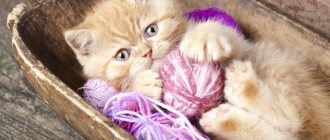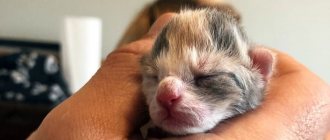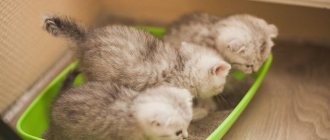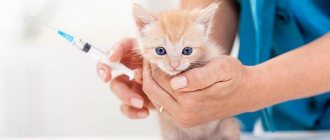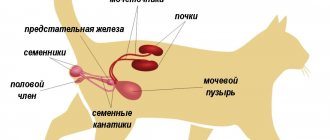After kittens appear in the house, the owner will immediately think about where to give these cute fluffy balls. However, an equally important point will be not only the place where the kittens will end up, but also the age at which they will be separated from the mother cat. In this article we will tell you when you can give away kittens, what age is optimal and why. You will also learn what exceptions exist and the negative consequences of premature separation from the mother.
Kittens are ready for independent living only at a certain age.
Stages of a kitten's life
Before getting down to the question of at what age it will be possible to give up kittens to other hands, it is necessary to study information about the stages of a kitten’s life that it simply must spend together with its mother cat.
In the life of a small kitten, the first few months are very important. They are of decisive importance, because he begins to learn about the world around him and develop. Everything he learns and learns as a skill will help him become a healthy adult animal. The owner of small kittens must understand how growth occurs at different stages, only then can he gain confidence that he is doing everything possible to create the best conditions for the normal development of small furry pets.
The first months are very important for the development of the kitten.
First week
After birth, the kitten immediately begins to suckle milk. As a rule, during the first three days of life, kittens choose their favorite nipple, and this preference continues until the end of the milk-feeding period.
It is necessary to attach the kittens to the mother's nipples as quickly as possible, preferably in the first hours after birth. Because it is during this period that the cat’s mammary glands begin to produce colostrum, a thick substance that contributes to the formation of the kittens’ immunity.
Around the fifth day, kittens open their eyes. At one week of age, their umbilical cord falls off. Weight gain ranges from 10 g to 30 g daily, so it is important to weigh the kittens every day and monitor the mother's behavior if she refuses to feed them.
It is important that kittens start drinking cat's milk right away.
Second - third weeks
At this age, kittens spend about 90% of their time sleeping. But sometimes they already try to get up. By the end of the third week, it is noticeable how rapidly they are growing. In addition, the first milk teeth appear - there will be 26 of them in total. But the molars will appear only at the age of five to seven months.
4 – 5 weeks
At one month of age, the kitten begins to explore the surrounding space, actively plays and communicates with other kittens, its brothers and sisters. At this age, kittens may already show interest in their mother's solid food. In this case, they can begin to be transferred from milk to a more suitable food. Gradually, kittens are offered food soaked in warm water or a specialized milk replacer, which will be easier for them to consume and digest.
Kittens actively communicate with each other
6–10 weeks
After reaching the age of two months, kittens, as a rule, stop receiving mother's milk and switch to self-feeding. You can switch kittens to a specialized food that will provide them with all the necessary nutrients and suit their size and texture. Kittens that are going to be sent to other homes must undergo a vaccination procedure. This issue can be discussed with your veterinarian.
After two months, kittens are ready to eat special food
Negative psychological factors of early weaning
According to statistics, in 80 cases out of 100, when adopting a kitten before three months of age, minor and medium-sized problems arise. In the remaining 20 babies they had a serious form. More than a third of pets separated from their mother too early acquire the habit of sucking on pillows, soft toys, and blankets. 40% of kittens have an aggressive attitude towards people. Many babies, separated from their mother before 2 months, are too timid, afraid of sounds, strangers, and do not adapt well to a new environment. Such pets often exhibit psychoneurotic dysfunctions.
Up to 3 months, kittens undergo the formation of their main organs and systems; during this period they receive the main lessons from the cat, learn to contact the external environment and people. A pet that has not gone through this important period in a familiar society with its mother, sisters, and brothers often:
- does not comply with the rules of cat hygiene;
- difficult to switch to regular diet;
- He is disobedient and poorly trained in the litter box.
A serious problem is the psychological stress experienced by children who have not undergone social adaptation next to their mother. They are hit by several negative factors at the same time. They are deprived of the guarantees of safety that a cat provides, they are surrounded by foreign objects, smells, sounds, they do not know how to properly explore this area and look for a reliable shelter. No matter how caring the owner is, he will not be able to explain all these wisdom to the kitten the way a mother would.
At what age can kittens be separated from their mother cat?
So, back to the question, when can kittens be given away or even necessary? You need to find good owners for them as soon as possible. But how can you separate kittens from their mother as painlessly as possible? How long should it take? Maybe when they stop eating the cat's milk and start eating on their own? Or is there some other reinforced concrete criterion?
Kittens can be separated from their mother no earlier than 12 weeks.
When people are looking for a new pet to add to their home, they want it to be very small, because it is so cute and funny. However, a responsible breeder or simply the owner of a large number of small furry animals will not sell or give away a kitten younger than twelve weeks.
Why was this age chosen?
There are two factors why the kitten was chosen at this particular age when it is time to give it to another home.
Factor one: in order to get used to a new home, the kitten must be young enough. Three-month-old kittens will need much less time to get used to their new surroundings and new people. They more easily perceive everything new that appears around them; their brain is just beginning to develop. Kittens have not yet had time to leave many memories of the place where they were born, so having received a lot of love and care in their new home, they can easily survive parting with their mother. Of course, with enough time and proper care, you can train an old cat to a new home. However, as a rule, the younger the cat, the faster and easier it is to form a bond between her and a person.
It is necessary to carefully monitor the kitten’s readiness to go to a new home.
Factor two: The kitten must spend enough time with its mother and brothers and sisters to learn the necessary rules of behavior. Some manifestations of character and habits are completely subordinate to instincts. Others are laid down by training. Some are related to both instinct and acquired experience. The best teacher for a kitten is the mother cat. Interacting with their siblings helps kittens establish the ability to socialize with other cats later in their lives. A few weeks in general company are necessary to acquire good cat manners. During play, for example, kittens learn to control and regulate biting and scratching.
Is it possible earlier than the recommended date?
To wean kittens from their mother cat, they should ideally be between twelve and sixteen weeks old. This is enough time to learn how to behave, but they are still young and flexible to quickly adapt to a new home. There are, of course, situations when a kitten must be given away before it turns twelve weeks old. But still, try to at least keep them with their mother until they are confident in eating solid food (usually at least eight weeks old). Every extra day spent with their mother cat will help their future mental and social development.
A mother cat can teach her babies a lot
Are there exceptions to the rules?
There is an exception to all rules. It is present here too. Feral kittens are such a case. These are kittens that were born to a street cat and have never had any contact with people. In this case, the need to learn to live with people outweighs their need to communicate with their mother and brothers and sisters. Because by staying with their mother for several months, the kittens will learn to be afraid of people. So, if you care for such a cat and her kittens, it is better to take them home as early as possible. They will calmly overcome their fear of people and successfully socialize. Of course, the ideal option would be one in which you take (and, therefore, save) both the cat and the kittens.
Kittens should be taken from the street as early as possible
Another exception would be the death of the mother cat immediately after giving birth. Then the newly born kittens need to be kept warm. They need to imitate the warm side of their mother, so a hot water bottle is placed in the box with the babies. The temperature of the heating pad should be 40 degrees. Babies are fed from a pipette or a special nipple. Cat milk or a milk substitute can be purchased at a pet store or veterinary pharmacy. The mixture is heated to a “steamy” temperature (this is +38 degrees) and fed to the babies. Up to 2 weeks, the cub should eat every 3 hours. From 2 to 4 weeks, the intervals between meals are increased to 4-5 hours. From 5 weeks, kittens are fed 4 times a day.
Kittens left without a mother need very careful care.
Newborn kittens must have their tummy and inner thighs massaged to facilitate toileting with careful circular movements, and also wiped with a damp cloth under the tail.
How and what to feed your baby?
When the kitten is six weeks old, they begin to feed it seven times a day, with special dry food.
Before distributing the cubs to other people, the breeder must tell them how the cubs ate, since a sudden change from one food to another causes dyspepsia in kittens. At 6 weeks the animal is switched to dry kitten food. The number of feedings is 7 times a day and as they grow older, one feeding is eliminated every month. If the cat is purebred, a large selection is offered by Royal Canin, which produces food for Maine Coon, Persian, Siamese, and British babies. Or they are fed with special high-quality food with o, “Pronature”, “Origin”, “Akana”, “No”, “Go”, “Karnilov”, “Nutram”.
A small pet's diet should include boiled boneless fish and liver (no more than 1 meal every 2 weeks), raw frozen meat, cut into small pieces. Steamed meat products are strictly not recommended. Minced meat is undesirable because the baby will not learn to chew. Gluten-free porridges are healthy - rice, buckwheat, oats with the addition of meat ingredients and boiled vegetables. Raw yolk and low-fat cottage cheese can be 1 r. in 7 days. All products should be introduced gradually, in small portions, observing the body's reaction. After a year, an adult cat is given food with the Adult symbol if there are no health problems.
What should a kitten be able to do by the time it starts living independently in a new home?
When the time comes and the kitten needs to move to a new home, he must be completely independent of his mother and have certain skills. This means that during the period of independent life, by twelve weeks, the kitten must be trained to use a tray and a scratching post. Also, to avoid problems with feeding, he should switch from milk to solid food.
When accustoming a kitten to food, you can use the following method. Place a bowl of food in front of the baby and dip his face into it. When the kitten gets a taste, he will begin to eat on his own.
The kitten must learn to eat on its own
The kitten usually learns how to go to the toilet using the litter box by watching the mother cat. At first he may just play with the filler, but later he understands its purpose. The main thing is not to place the tray far from the kittens’ habitat; they are still too small and will not be able to tolerate it for long.
A cat mother can teach a baby to use the litter box
I also start using a scratching post for kittens following the example of their mother. To attract their attention, you can hang up more toys or spray them with catnip-scented spray.
It is also important for kittens to gain social skills, such as human contact. From the first days of life, the kitten must be held for at least 10-15 minutes a day. They are also useful to play with, pet and talk to.
It’s good when a kitten can calmly relate to procedures such as bathing, brushing, examining teeth and trimming claws. Babies should be allowed to interact with different people and animals, as well as explore new sounds and smells.
It is easy for contact kittens to get used to a new home
Possible health problems
Significant problems can also arise with the health of a pet that is separated from the cat for up to three months. During this period, the most important processes in the formation of organs and systems take place. The presence of breast milk eliminates the deficiency of essential minerals, vitamins, and other microelements. This allows the digestive system to establish the production of enzymes necessary for food processing, gradually, in a normal manner. A kitten that begins to eat regular food before the age of three months may experience various disruptions in the gastrointestinal tract. This often becomes the cause of chronic diseases.
It is known that cats have good health; their bodies cope with many diseases on their own, without medical help. These qualities are ensured by the strong immunity that nature provides to animals. The body of a newborn kitten is practically deprived of this natural defense and cannot produce antibodies to fight pathogenic microbes and bacteria. They come to babies from mother's milk. If kittens are deprived of this source too early, immunity does not have time to form and strengthen. Consequently, a favorable environment is created for the development of infections and inflammations.
Veterinary pharmacology includes vaccinations to strengthen the natural defense system. But they can only be done at 2 months. After this, the kitten remains defenseless against these aggressors for some time; it still requires help in the form of mother's milk. Therefore, babies who were taken before three months often get sick.
Negative consequences of premature separation of a kitten from its mother
If kittens are taken away from the cat immediately after birth and not allowed to feed on their mother’s milk, then they will not receive the necessary antibodies and strong immunity. This will lead to frequent illnesses that can be severe.
The kitten's digestive system may be disrupted. Kittens that have not eaten much of their mother's milk have difficulty digesting adult food; their enzymes have not yet matured. As a result, diarrhea or dysbacteriosis may begin.
There are many negative consequences of early weaning of kittens.
A kitten deprived of its mother's training will take longer to get used to the tray and use of a scratching post. Kittens weaned early do not know how to calculate the force of their bite during play, or how to retract their claws. Such babies experience severe stress in the absence of their mother and their brothers and sisters. All this can greatly affect the psyche of an adult cat, causing nervous disorders.
When can you separate a kitten from a cat?
Kittens can be given away no earlier than two months after birth, and the new owners need to pay maximum attention to the babies.
Scottish Folds can be adopted after their ears drop, but not earlier than 2 months. Separating a one-month-old baby from its mother is not recommended, since it is stressful for the offspring and the cat, leads to psychological illnesses and even ends in death. The optimal age for giving away kittens is from 12 weeks. Being deprived of maternal care at 7 weeks, the babies still need their mother, which means that the owners will have to pay maximum attention to the new residents. If a cat abandons the kittens, does not respond to them and does not feed them, the cubs are taken away and transferred to artificial nutrition. In this case, you can give the kitten away immediately, provided that the owner devotes himself entirely to care and feeding.
How to give away a kitten correctly
Before giving a kitten to a new owner, you need to ask whether the future owner has everything necessary. The baby will need:
- A place to sleep is a sun lounger. It is better to place the kitten in a box, covering it with woolen cloth. For older cats, a bed with low sides will be suitable. Some pets choose their own resting place, so if it is safe there, you can leave it there;
- Tray. If the baby is less than 5 weeks old, you need a basin with low sides. It is better to choose a regular plastic tray; closed toilets are not suitable for babies. Wood or corn filler is suitable;
- Bowl and drinking bowl. It is better to choose ceramic or plastic. Metallic ones can oxidize food and water;
- Scratching post. When your baby first appears indoors, you should show him where he will sharpen his claws. You can make a scratching post yourself from a piece of an old rug and hang it on the wall, decorating it with movable soft pet toys;
- Carrying for trips to the veterinarian.
The new owner needs to be told about the food the kitten receives and the type of filler in the tray that the baby is used to. The buyer should also be made aware of the vaccinations they have received. You can inform about the habits and character traits of the baby. It is necessary to tell about the rules of caring for the kitten, hand over the birth certificate and veterinary passport, if any.
The new home for the kitten should be ready to welcome the baby
All these actions will help not only the kitten, but also the new owner, to quickly get used to each other and become best friends.
Proper feeding of a cat in the first days after birth
Immediately after giving birth, the cat may refuse to eat. If your pet does not eat well in the first few hours after giving birth, this condition can be considered normal. You need to be wary if your cat refuses water. Try offering your pet a warm drink, low-fat broth or fermented milk products. If you give water, it is advisable to add a little salt and sugar to it.
When preparing for the birth of a cat, it is better to buy a rehydron solution, which retains fluid in the body. It quickly and effectively helps in case of severe dehydration.
If after giving birth the cat refuses to drink and has a fever, consult a doctor immediately - these are the first signs of eclampsia.
The diet of a nursing cat provides for its special needs. It is not recommended to feed a young mother with simple food, especially with economy-class dry food. If your pet is accustomed to commercial food, it is better to consult a veterinarian for advice and selection of the optimal product. Many manufacturers produce special food for nursing cats, which enhances lactation and contains increased amounts of proteins and vitamins.
With a natural diet, in the first three days, it is recommended to give the cat only soft food. It is advisable to boil meat products, chop them and dilute them with broth. For the entire period while the cat feeds the kittens with colostrum, dairy products should be a priority.
To stimulate a cat's appetite, food needs to be heated.
By the third day, most cats can eat normally and are introduced to familiar foods. Changes should affect the frequency of feeding. In the last stages of pregnancy, the cat is physically unable to eat enough food at one time and must be switched to fractional feeding. Immediately after giving birth, it is also recommended to feed the cat in small portions, but often, 3-5 times a day.
